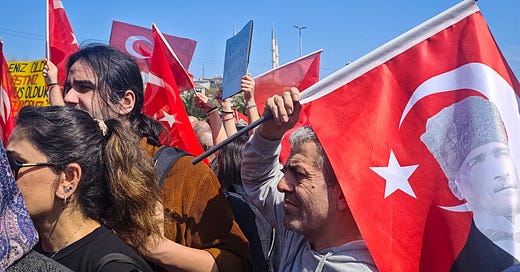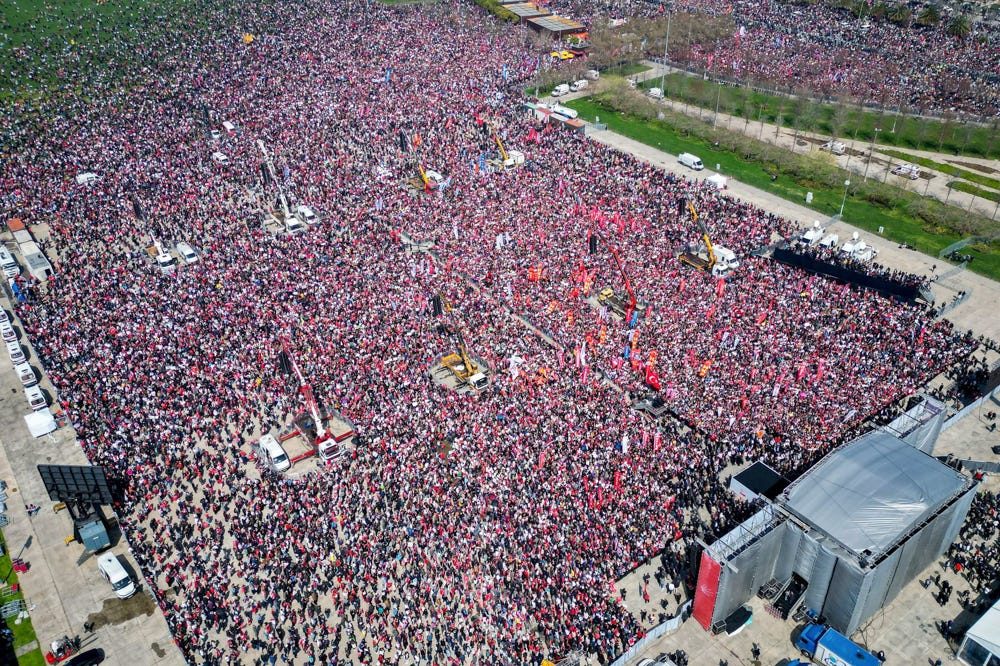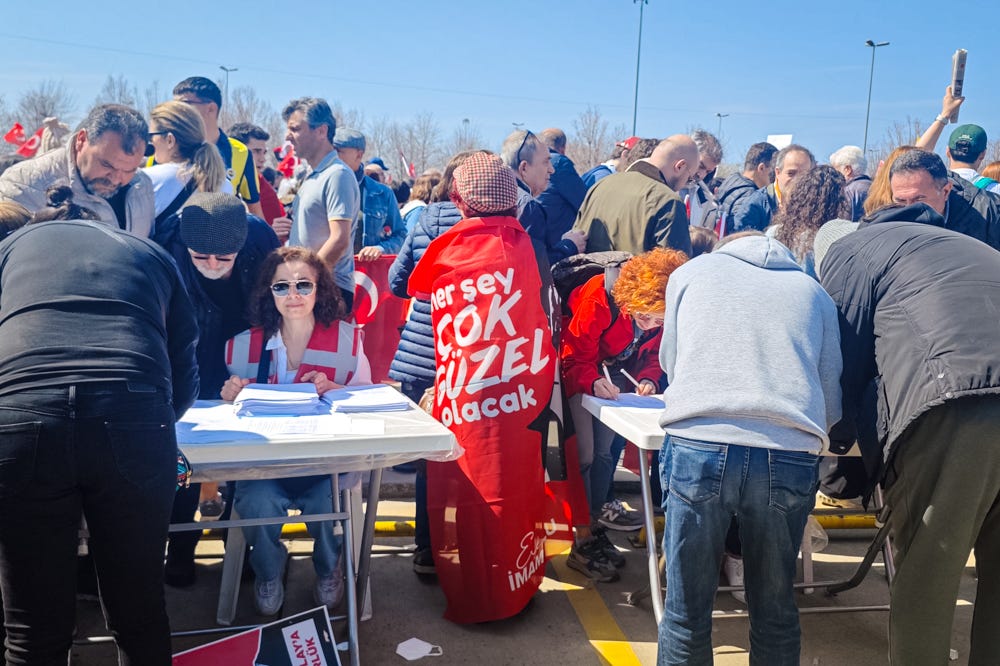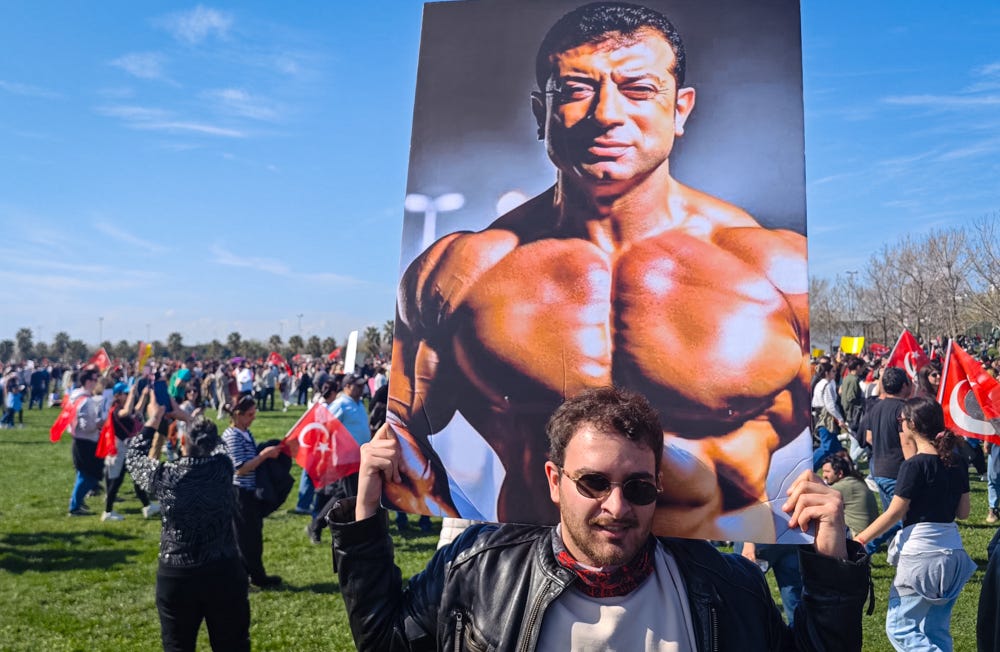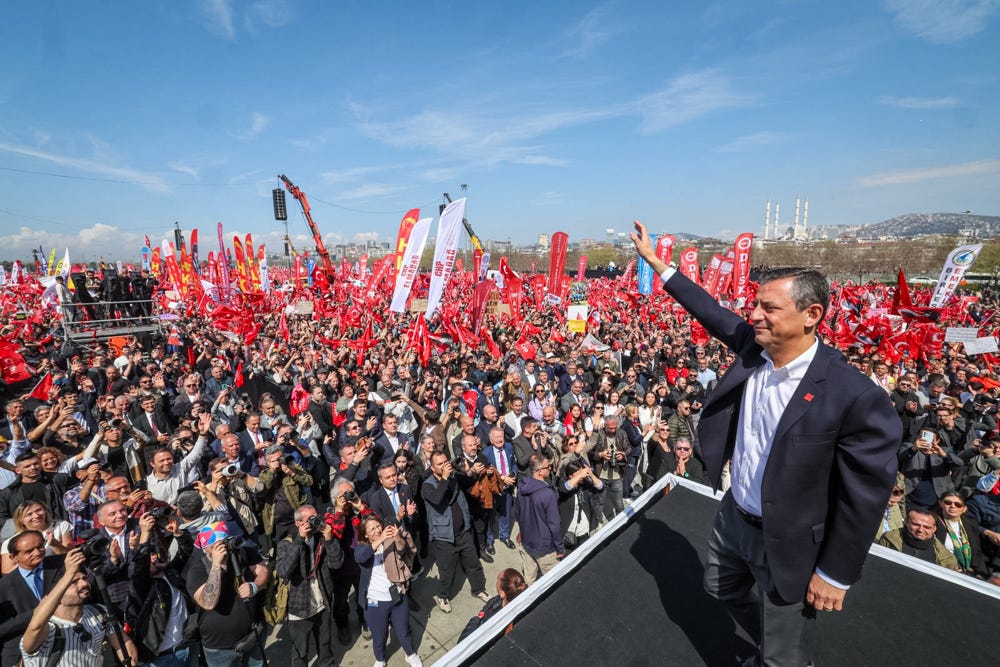İSTANBUL — Hundreds of thousands of people gathered in Maltepe, İstanbul Saturday, March 29, for the "Freedom for İmamoğlu" rally, demanding the release of the city’s imprisoned mayor – and now the opposition’s presidential candidate – Ekrem İmamoğlu.
"There’s no turning back anymore. The time for talk is over. It’s time for action now," said Cansel, a middle-aged woman who had traveled from Antalya to attend the rally.
"It’s over now. Fears are over," Mine said, standing next to her, relishing the opportunity to voice her discontent, which she said had built up over the years.
The main opposition Republican People's Party (CHP) claimed that 2.2 million people joined Saturday’s gathering while local authorities said the number was closer to 150,000. Using the MapChecking app, Turkey recap estimates 500,000 to 1 million people could have been at the designated venue.
The event featured hour-long speeches by Ankara Mayor Mansur Yavaş, party leader Özgür Özel and a letter read by an AI-generated İmamoğlu.
"I have no fear because the nation is united. The nation is united against the oppressor," İmamoğlu’s letter said.
Turkey has been gripped by the largest wave of protests seen in a decade following the mayor’s imprisonment on March 19, along with more than 100 associates. Many view the corruption and terrorism charges against İmamoğlu as politically motivated with aims to oust a candidate considered capable of defeating Pres. Recep Tayyip Erdoğan in a head-to-head vote.
"You are seizing the future of Turkey, resisting this coup, and defending our democracy," Özel told the crowd in Maltepe.
CHP Strategy
The CHP leader has called İmamoğlu’s detention a “coup” intended to block him from running for president. To channel and sustain the outrage and actively challenge Erdoğan’s 22-year rule, the opposition now has put forward a strategy consisting of three main points:
Mass rallies held by the CHP twice a week – one in an İstanbul district on Wednesdays and another in different provinces on the weekends to keep people in public spaces.
A nationwide petition campaign to demand İmamoğlu’s release, mirroring the mobilizing effect of the solidarity ballot boxes used in the CHP’s March 23 primary election – which saw over 15 million people vote for the jailed mayor.
Large-scale boycotts of pro-government businesses, including advertisers on government-linked media companies.
The above aims to pressure the administration into calling early elections – with İmamoğlu remaining the CHP candidate regardless of his imprisonment – and to evade further clampdowns on the party, sources close to the CHP told Turkey recap.
The sources noted forcing a snap vote would be difficult as the ruling alliance holds the majority vote in parliament and near-total control over state institutions, yet they emphasized the move was necessary to prevent further sliding towards autocracy in Turkey.
*** Editor’s note: We will host a live video chat with political scientist Arife Kose Wednesday, Apr. 2 at 1500 TRT / 1200 UTC. Turkey recap subscribers will get the invitation link soon.***
Powder keg
"Mr. Ekrem actually lit the fuse," Kadir Demiryürek, a political advisor for the CHP told Turkey recap, stating that years of economic and democratic decline propelled many to the streets on March 19 following the mayor’s arrest.
"There is this basic psychological argument – whatever is suppressed surfaces back with the same force," Demiryürek added, remarking that the government likely didn’t expect such a widespread and enduring backlash.
The groups mobilized over the last week were diverse, ranging from young people flashing the ultra-nationalist grey wolf salute to elderly women showing the peace sign affiliated with pro-Kurdish movements. Authorities vigorously intervened using tear gas and plastic bullets, detaining nearly 2,000 people, including journalists.
Although the CHP concluded its nightly mass rallies at İstanbul’s City Hall on March 24, demonstrations – largely fueled by students – continued across the country.
Saturday’s Maltepe rally drew a larger turnout than expected, with many unable to enter the area due to overcrowding, heavy police controls and barricades. This suggests that the momentum still lies with the opposition, according to a former CHP political advisor who spoke with Turkey recap on the condition of anonymity.
The former advisor said the event aimed to gauge the level of opposition support and determine whether the CHP has the strength to expand these gatherings and street protests across Turkey after the Eid al-Fitr (or Ramazan Bayramı) holiday, which ends April 6.
Many attendees at the Maltepe rally, including both CHP members and non-members who spoke to Turkey recap, said they joined not only to support İmamoğlu's release but also to protest the country’s democratic backsliding, lack of prospects and economic decline.
They conveyed a sense of optimism and energy about showing the government "enough is enough", while firmly believing they could win if elections were to take place.
However, the mass arrests and heavy police violence seemed to have invoked fear, with some refusing to have their pictures taken or joking about being taken into custody after an interview with the media.
"We want his regime to end. We want Tayyip Erdoğan to go," said Ceyhan, who sat at the back of the rally waiting for İmamoğlu’s letter to be read out. Expressing fear to share his last name, he had signed a petition for the mayor’s release earlier, citing a desire for change.
"The country is finished. Inflation is high. Everything is expensive. People are deprived," he said.
Yet presidential elections aren’t due until 2028. Therefore, according to Demiryürek, the CHP’s growing calls for boycotts, petitions and rallies are aimed at leveraging the nationwide discontent to compel the administration to the ballot box as soon as possible.
"No single instrument alone is sufficient here. But they are interconnected," he said, referring to the different strategies taken by the CHP to shake up the country. "Street protests link to boycotts, boycotts to petition campaigns and petitions to rallies in different cities and districts each week – [all] to disrupt the system.”
Demiryürek went on, stating with optimism that the government’s ability to withstand challenges to its leadership would be determined by the opposition's performance.
"Even though we are not in power, if we continue like this, we will be – we can change this," Demiryürek said.
For snap elections to happen, 360 votes are required in parliament – a number the opposition is far from achieving. Furthermore, Erdoğan has refrained from responding to requests for an early vote.
Instead, he alleged that the İstanbul Municipality was looting the city as part of a message during Eid al-Fitr on March 30. He previously criticized the boycotts for wrecking Turkey’s economy and slammed the opposition for being "so desperate that they would throw the country and the nation into the fire."
A cornered cat
The former CHP political advisor sees Özel’s recurring calls for concrete actions – like boycotts, petitions and preserving a presence in the streets – as positive. It keeps the party on the front foot to uphold constant pressure on the ruling regime while, at the same time, providing a vital defense for Özel’s and the CHP’s survival.
In recent months, the party has been under growing pressure, most recently with corruption probes into the opposition-controlled Ankara municipality. Meanwhile, speculation about a potential state-appointed trustee to the CHP – stemming from supposed irregularities in Özel’s 2023 appointment – has prompted Turkey’s oldest political party to call an emergency congress for April 6.
"If he withdraws from the streets, Özgür Özel knows that he may lose his seat because of what has happened so far. He could be arrested," the former advisor said, speculating that Erdoğan will likely expel Özel as soon as the unrest dies down.
"Think of it like this: when you corner a cat, it pounces on you like a tiger to escape," the former CHP advisor said, highlighting the stark power difference existing between the opposition and the ruling administration.
Still, some dynamics play in the opposition’s favor. Unlike Turkey’s last major demonstrations – the 2013 Gezi protests – the country’s economy has been in a slump since 2018, exacerbated by Erdoğan’s unorthodox interest rate policies and subsequent austerity measures. This has left many citizens with their backs against the wall, the former advisor said.
"You can’t scare these people with police batons and water cannons anymore," he said.
Moreover, economic concerns shifted public approval away from the ruling coalition parties in the March 2024 local elections, which the CHP decisively won. Additionally, resentment against the present-day protestors seems relatively low despite extensive government-led campaigns to demonize them.
"Currently, 73 percent of Turkey supports these protests. This is a very big percentage – a very big number," the former advisor said, citing a recent KONDA poll, which indicates that even some supporters of the ruling party disavow İmamoğlu’s arrest.
"If there is an early election, if there is a free and fair election, Erdoğan will lose," he added.
Both the former political advisor and Demiryürek emphasized the current moment might be the main opposition party’s last shot to take on the government, as Erdoğan now tightly controls state institutions and may no longer shy away from other ‘unthinkable’ anti-democratic measures.
"No one expected Ekrem İmamoğlu’s arrest either," the former advisor said.
Turkey recap is an independent, reader-supported newsletter that helps people make sense of the fast-paced Turkey news cycle. Contact us: info@turkeyrecap.com.
Subscribe here on Substack (or on Patreon for a student discount). Paid subscribers get full access to our recaps, reports, members-only chat and news tracking tools.
Turkey recap is produced by our staff’s non-profit association, KMD. We are an affiliate of the Global Forum for Media Development and aim to create balanced news that strengthens local media by supporting journalists in Turkey.
Diego Cupolo, Editor-in-chief
Emily Rice Johnson, Deputy editor
Azra Ceylan, Economy reporter

